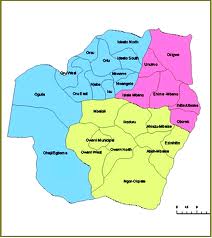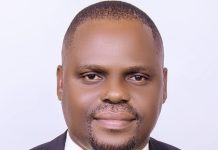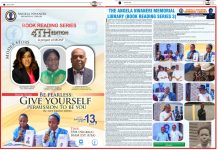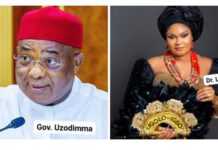
By Barr. Okere Kingdom Nnamdi, 08036288528
Come Friday the 7th November 2014, by 10 am in the morning, Imo youths will once again gather at the Villa Maria Guest House, along Whetheral road Owerri, the venue of the Imo Equity symposium and public presentation of a book entitled Imo Charter of Equity: A Jurisprudential Analyses. The event is jointly organized by organized by Imo Youth Democrats, United Imo Youth Movement and the Imo State Chapter of the National Youth Council of Nigeria.
Having watched with keen interest, the recent political developments in Imo state, Imo Youth Democrats and the National Youth Council of Nigeria (Imo State Chapter) and United Imo youth movement is jointly organizing this Imo Equity symposium with the aim to champion the restoration of equity, justice and fair play in the zoning the governorship of Imo state.
Our vision is to champion the restoration of zoning and equitable spread of the Governorship position of Imo State and other political offices. It is our submission that the intention of the drafters of the 1999 constitution for providing in section 14 sub section 3 and 4 is to ensure that elective and appointive political offices are spread among the peoples of the Federation, so as to promote unity, equity and fairness. Importantly also, Section 224 of the constitution expressly provides that the programmes as well as the aims and objectives of political parties must comply with chapter two the constitution, which includes section 14 cited above.
The Drafters of the Nigerian Constitution also made provisions for the spread of political appointive offices. Thus, Section 192 of the Constitution provides “there shall be such offices of Commissioners of the State as may be established by the Governor. Sub section (2) provides “ any appointment to the office of the Commissioner of a state shall if the nomination… is made by the Governor, confirmed by the House of Assembly, and in the making of any such appointment the Governor shall conform with the provisions of section 14 (4) of the Constitution. The Constitution also provided for a body (The Federal Character Commission of Nigeria) under paragraph 7 and 8 of Part 1 of the 3rd Schedule, to ensure the implementation of the above cited sections.”
According to him, having construed the above cited sections of the law, Imo Youth Democrats and her collaborating Associations believe strongly that equity, justice and fairness should be restored so as to guarantee smooth democratic transition in Imo state. And the Imo Equity symposium is a demonstration of our efforts and commitment towards achieving our collective victory come 2015 general elections. the event is coming at the right time when the political ovation is loud in the chequered Imo socio-political milieu.
No doubt, the burning issues about zoning in Imo and the 2011 governorship election is the fact that Governor Okorocha inequitably came to office in 2011 after Orlu zone has taken 8 years under Chief AchikeUdenwa. Indeed, Governor Okorocha’s emergence in 2011 is a bad omen to the charter of equity.
The Book, IMO CHARTER OF EQUITY: AJURISPRUDENTIAL ANALYSES, will provide the political class a unique opportunity to view the Imo Charter of Equity in its socio-political and philosophical contexts and also provides great opportunity for Lawyers’ further introspection on the vexed and controversial issue of zoning in our polity, in a more rational juxtaposition with the realities of our peculiar political system and ethnic jingoistic jiggery-pokery; as we are presently witnessing in Imo State and in many parts of Nigeria, over which geo-political zone, or ethnic group or among the contending Senatorial Zones occupy various political elective offices. It book is a good research and reference material that will be recorded in the archives of history and posterity.This article is clued from chapter three of the book and it’s intended to give an insight to the Imo reading public on what to expect in the book.
There is this argument among the antagonists of the Charter of Equity, begin the issue of whether or not there is any formal document signed by Imo political leaders called Charter of Equity or whether it is a “gentleman agreement”, otherwise a convention. Other issues that will be considered under this subheading are the questions of who are the signatories to the Charter of Equity? Who are the leaders that made the Charter of Equity? And what gave them legitimacy?
For the sake of history and posterity, let it be recorded in this book that the question of who are the makers of the Imo Charter of Equity and when was the Charter drawn cannot be over emphasized. In 1999, Imo leaders met, in a meeting convened by Chief E.C Iwuanyawu whereupon it was agreed that the governorship of the state under every democratic dispensation be rotated among the three zones.
And it was this equitable understanding that eventually produced Chief Evan Enwerem as the Governor under the Ibrahim Babangida transition programme. And thus, Chief Evan Enwere became the 1st beneficiary of the principle of equitable spread of Imo Governorship. Unfortunately, the third Republic and tenure of his government was short-lived as a result of the sudden overthrow by the late SaniAbacha led junta on the 2nd of November 1993.
In 1999 on the return of the current democratic dispensation, Imo leaders met and vowed that the charter of equity must continue on its journey to the land of democratic justice. Addressing the youths of Owerri zone at the recent Youth Delegate conference, held at Owerri Hotel plaza, Chief Chris Asoluka a frontline political leader stated that Owerri leaders have been and remain much committed to the Charter of Equity, to the extent that Owerri sons and daughters who aspired to occupy the governorship in 1999, 2003 and 2011 were vehemently told to drop their ambition. According to him, in 1999, an Owerri son Barr.Anumodu was not supported by Owerri leaders because the Charter of Equity favouredOrlu zone. Again in 2003 after Udenwa’s first term, the issue of zoning and the constitutional right of second term for a serving governor was not well-defined, and therefore the contest was open to all the zones, in view of the fact that every zone as at 2003 had had a shot at the governorship, viz, Dee Sam Mbakwe (Okigwe) Chief Evan Enwerem (Owerri) and Chief AchikeUdenwa (Orlu). And this informed the decision of aspirants from other zones to contest the 2003 election. And the rest is now history, as Chief Udenwa completed his constitutional 8 year term.
Chief Asoluka further explained that in 2007, after Udenwa’s administration, Owerri zone also had the constitutional and equitable rights to contest in view of the fact that the governorship had gone round the three senatorial zones, and the issue of which zone begins the second round of zoning was not also well-defined. He recalled the Araume saga and Professor Maurice Iwu’s factor that gave Okigwe zone victory over Owerri zone, noting that it was on the above premise that the election of Chief Martin Agbaso was nullified, and eventually IkediOhakim emerged. The most interesting part of Chief Asoluka’s analyses was how the leaders of Owerri People’s Assembly shouted down at Captain Emmanuel Ihenacho in 2011 when he sought to contest election against Chief IkediOhakim, because it was rational for Ohakim to complete eight year tenure for Okigwe zone, as was the case of Chief Udenwa. He stated that it was not the making of Owerri zone that Ohakim’s second term was truncated.
Recently also, Imo leaders met during a public forum on the amendment of the 1999 constitution, and agreed on the Charter of Equity. The meeting was held at Imo Concorde Hotel on the 12th November 2012. The prelude to the communiqué issued at the end of the meeting reads “ at the instance of three distinguished Senators representing Imo state in the Senate of the Federal Republic of Nigeria, namely Senator Chris Anyanwu,(Owerri zone) Senator Hope Uzodinma (Orlu zone) and Senator Matthew Nwagwu (Okigwe zone) , a public forum of key stakeholders in Imo state was conducted at the Imo Concorde Hotel, Owerri on the 12th Nov. 2012”
A jurisprudential summary of the communiqué reveals that it was a forum in response to the directive of the Senate of the Federal Republic of Nigeria that Senators should go to their constituencies and consult their people and elicit their inputs on the 18 issues articulated by the Senate to guide the amendment of the 1999 Constitution of the Federal Republic of Nigeria. The public forum considered the submission of each of the senatorial zones to arrive at a common Imo state position on each of the 18 issues, and thereby agreed on the following as the harmonized Imo state position on all the issues:
(a) RESTRUCTURING: restructuring of Nigeria to recognize the six geopolitical zones of Nigeria in the constitution was endorsed by Imo leaders. Imo leaders agreed that the existing Six geopolitical zones of Nigeria Should be recognized in the constitution and the equality of the Federating zones be entrenched in the constitution.
(b) FISCAL FEDERALISM: fiscal federalism is considered appropriate to promote unhindered competitive development of the federating units. The indices of derivation, national interest and population density should be sustained in revenue sharing.
(c) DEVOLUTION OF POWER: the devolution to de-concentrate power in the federal government and increase the autonomy and functions of other tiers of government should be reflected in the constitution. The following should be in the exclusive list of the Federal government (i) Defence, internal and external (ii) immigration (iii) monitoring of fiscal policies (iv) customs and exercise (v) foreign affairs (vi) weight and measurement etc.
(d) ROTATION OF OFFICE (CHARTER OF EQUITY) :the rotation of the executive office of the President along the line of the existing six geopolitical zones should be entrenched. Also the rotation of offices should be extended to the executive office of the Governor at the state level, among the three Senatorial zones and Chairmen at the local government levels.
(e) RESIDENCY AND INDEGENESHIP: persons who have lived in any state of the federation continuously for a period of 10 years should have the same rights as the indigenes of the state and persons who were born in any state of Nigeria and their parents have resided there for 10 years or more should have rights of indegenship of the state. And these should be entrenched in the constitution as it will foster national integration and sense of belonging amongst citizens wherever they reside.
(f) NIGERIA POLICE: Imo state favours the continuation of the existing Federal Police arrangement covering all the states of the Federation. The idea of zonal, state or local government police is completely rejected.
(g) Gender and special interest: married women should be free to contest election and also should be eligible for appointment into public offices from their husband’s constituency. For appointive offices, women should be reserved 30 percent, but for elective offices, they should compete with others. Qualifying age for contesting various elective offices at the local government levels should be lowered to accommodate the youth and retirees who may make a career in politics. Special interest of persons with disability should be protected.
(h) Local government system: Imo state favours full autonomy for the local governments in Nigeria. It also endorses Federal control of the creation of local governments and constitutional amendment to deny revenue allocation to unelected local government councils. Particularly Imo state moves for the abolishing of the state joint local government account so that allocations due to local government would be paid directly to them. State electoral commission should be scrapped and local government election should be conducted by the Independent National Electoral Commission.
(i) STATE CREATION: at least one state should be created in the south east between Imo andAnambra state to be known as Anim state. OhajiEgbema and Agwa Clan in Oguta should be retained in the Imo state that survives the state creation.
(j) IMMUNITY CLAUSE: immunity clause should be removed for the President, Vice President, Governors and their Deputy on criminal matters only. The clause should be retained for civil actions until the expiration of their tenure to avoid unnecessary distraction.
(k) TENURE OF THE EXECUTIVE: a single tenure of 5 years for the President was considered appropriate for Nigeria in tandem with the agreed proposed rotation of the executive office of the President among the six federating geopolitical zones. If the President is incapacitated and cannot act in office, the Vice President should for 90 days act in that capacity, during which election must be held. The newly elected President must come from the same zone as the former President and will serve out the term of his predecessor. The same should be applicable with regards to the office of the Governor and his Deputy.
(l) FEDERAL CHARACTER: the Federal Character principle should be retained. However, the function of the commission can be expanded to protect the interest of all disadvantaged social groups like women and people with disability.
(m) JUDICIAL REFORM: should be reserved for the National Assembly.
(n) MAYORAL STATUS FOR THE FCT: The idea of granting Mayoral status for the FCT was rejected. It is believed that the status quo in which the FCT is administered by a Minister appointed by the President will serve the best interest of the Federation. In line with the rotational principle, the position of FTC Minister should be made rotational amongst the six geopolitical zones and the President should reflect this in his choice of Minister for the FCT.
(o) LAND USE ACT, NATIONAL YOUTH SERVICE, AND CODE OF CONDUCT.: LAND USE ACT: the forum agreed that decision on the land use Act should be reserved to the Southeast Governor’s Forum, who should setup a technical committee to consider and make recommendations on the issues. NATIONAL YOUTH SERVICE: the Forum agreed that it should be removed from the constitution. CODE OF CONDUCT BUREAU: the forum agreed that it should be retained.
(p) TRADITIONAL RULERS: Traditional Rulers should be given advisory roles to play in their localities in the area of custom, culture and land use matters and should be responsible for the maintenance of peace and security in their communities, and should be placed on fixed allowances.
(q) STATE INDEPENDENT ELECTORAL COMMISSION: state independent electoral commission should be abolished and all elections in Nigeria are conducted by the Independent National Electoral Commission INEC.
(r) STATE HOUSE OF ASSEMBLY: State House of Assembly should be granted financial autonomy/independence as is the cases with the National Assembly to enable them carry out their oversight functions without compromise.
The leaders of Imo state who acted as Rapporteurs and prepared the communiqué are (a) Chief Emmanuel Iwuanynwu (b) Professor Emma Obasi (c) Chief NwakanmaDiala-uka (d) Sir Innocent Igwe (f) Pastor OnyemaUbaka (g) Sir EJK Onyewuchi (h) Nze Ignatius Umunna. In attendance at the stakeholders meeting were (a) youth associations (b) women groups (c) civil society (d) academics (e) Imo House of Assembly members (f) National Assembly members (g) captains of industries.
Conclusively therefore, I hold the informed opinion that the Imo Charter of Equity is a reality and not fiction. It is a working-document, as well as a working-convention.
IMO CHARTER OF EQUITY AS A CONVENTION: Following form the above resolutions of Imo stakeholders, and the previous zoning arrangement that had so far guided our polity, it can be avowedly stated that the Imo Charter of Equity is an acceptable convention.
Bryan’s Black Law Dictionary 9th edition defines convention as a generally accepted rule or practice, usage or custom; among other definitions. Conventionalism in the same light is defined as a jurisprudential conception of the legal practice and traditional holding that law is a matter of respecting and enforcing legal and social rules.
Conventional Law, such as the Imo Charter of Equity is a rule or system of rules agreed on by persons for the regulation of their conduct towards one another. Conventional Law which usually is unwritten constitutes of agreement as having the force of special law between the parties by either supplementing or replacing the general law of the Land.
Constitutional conventions and constitutional questions are often legal issues that are not expressly provided for in the statute books, but are mainly resolved through Judicial-Jurisprudential interpretation. And this accounts for the reason this author through his Association, Owerri Youth Council is seeking for interpretation to section 14(3) as (4) vis-à-vis other sections of the constitution, with regards to effective spread of political offices. The case which is currently ongoing before the Federal High Court sitting in Abuja is discussed in chapter 5 of this book.
A Constitution, either written or unwritten is the fundamental and organic law of the land. The constitution establishes the institutions and apparatus of government, defines the scope of governmental sovereign powers as guarantee individual civil rights and duties.
An unwritten constitution embodies customs and values, some of which are not expressed in statute that provide the organic and fundamental law of the state. A good example of a Country that has largely unwritten constitution is the Great Britain. The British Constitution is a collection of historical documents, statutes, decrees, conventions, traditions and Royal prerogatives. Many aspects of a written constitution are based on custom and precedent.
Therefore, what is this Imo Charter of Equity? Is the Charter of Equity in a formal written document? Who are the parties to the Charter, what gave the Charter legitimacy? How did the parties to the Charter derive the power to make a Charter for the entire Imolites, and how fairly has the Charter been implemented?
The need for peace, progress and development in the society prompted man to exercise his reason (natural law) and came into organized society and thereby eliminating hostilities, including the killing, suppression, domination, and oppression of fellow human being, as we discussed above under Thomas Hobbes’ theory of natural law.
In the same manner, the need for a peaceful and progressive Imo State inspired Imo political leaders and stakeholders to gather at the Glass House, Owerri in 1991 before the emergence of Chief Evan Enwerem as Governor and in 1998, towards the making of Udenwa Governorship, whereupon they agreed on how to ensure that the governorship of Imo State rotates among the three senatorial zones in the state. And the wisdom (reason/ natural law) in what they agreed upon gave Imo people automatic sense of legitimacy, hence the acceptance of the power-sharing formula irrespective of the fact that some deviance contested the governorship election at one time of the other, against the understanding that the governorship position has been zoned to a particular Senatorial zone.
Legitimacy is simply referred to as lawfulness, just, acceptable and fairness. The Imo Charter of equity is a legitimate document if documented and a legitimate agreement if only conventionally implemented. Like the British unwritten Constitution, the record of the minutes of the meeting where the Charter was agreed upon also serves as a legitimate document. The Imo Charter of Equity is a call for unity, progress and socio political cohesion. It is a rational reasoning, as postulated by the proponents of the Natural Law School. Imo charter of equity is a clarion call for social justice.
CHARTER OF EQUITY IS ALSO VEHICLE DRIVING SOCIO-POLITICAL JUSTICE: The Black’s Law Dictionary DEFINES SOCIAL JUSTICE as “Justice that conforms to a moral principle, such as that all people are equal; one or more equitable resolutions sought on behalf of individual and communities who are disenfranchised, under-represented or otherwise excluded from meaningful participation in legal, economic, cultural and social structures with the ultimate goal of removing barrier to participation and effecting social changes”.
No doubt, the above definitions preferred in the law dictionary was the principles that guided Imo leaders in reaching the decision for a Charter of Equity so as to guarantee meaningful participation and remove domination and barriers to socio-economic and political advancement of any of the zone, irrespective of size, population, wealth and social ranking.
Imo charter of equity is a moving vehicle for socio political justice. The vehicle must at all-time be sound and in good condition to reach its destination. The destination is the destination to justice, and the destination to equity, a just destination in all ramifications.
In 2011 the vehicle that was driving the Charter of Equity was said to had had accident. Given that it did had accident, or as others would say, “there was a political accident that has capsized the vehicle driving the Charter”, what then is the most rational thing to do in other to keep the Charter moving? Abolish the Charter entirely? That would rather cause greater injustice to certain political zones, particularly Owerri zone, because the Charter was the basis upon which Orlu zone ran the affairs of Imo State for eight years under Chief AchikeUdenwa. And Okigwe zone for four years. o both sought to unconsciousl
The Charter produced Chief IkediOhakim as the Governor of Imo state in 2007, irrespective of the brazen display of political self-centeredness by two Orlu money bags, in the person of Chief Festus Odimegwu and Chief Tony Ezenna why takeover from their brother, Chief AchikeUdenwa in 2007.
That move was vehemently resisted by the people of Okigwe zone collectively who fought to ensure that the governorship of Imo State came to their zone; and eventually they succeeded, hence the emergence of Chief IkediOhakim as the Governor of Imo state in 2011, against all odds.
And it was on this historic note that the vehicle driving the Charter continued on the equitable movement. Chief IkediOhakim did all he could to ensure that all the zones were given sense of belonging in the Imo Project. And his visionary political thinking is so commendable. As if that was not to be, one man came with his bag of confusion and diverted vehicle on the equitable movement. That man is the incumbent Governor of Imo state, OwelleRochasOkorocha, from Ogboko, Ideato south LGA (Orlu zone) of Imo State.
He came with bags of odd, (political odds) and dispossessed the Charter on equitable movement. Okorocha’s political odd was made possible by the PULL-HIM-DOWN attitude of a powerful political leaders from Okigwe zone who did all they could to ensure that their brother IkediOhakim is pulled out of office. This Pull-him-down plan was abetted by some political leaders in Owerri zone and Orlu zone.
Accepted that the vehicle conveying the Charter had accident, how then do we put the Charter back on track? This is the big question and task confronting the entire political class in Imo state. The first urgent task before every reasonable person, even a passerby in any accident scene is to rescue the victim(s). This humanitarian task is done selflessly and relentlessly by all and sundry. It is also known as emergency search and rescue operation. At the accident scene, no one bears grudge against a groaning accident victim. Rather your sense of humanity and sense of reasoning (natural law) compels you as human being to become a voluntary emergence rescue worker; since the first reasonable tasks is to rescue the accident victims.
Therefore, I must advocate that in other to put the vehicle driving the Charter of Equity back on tracks, we must rescue the 2011 accident victims. Who drove the vehicle? Who bears the blame? Was the driver over-speeding, and what led to the accident? Was the accident fatal? Are there surviving victims arising from the accident? Etc. this is the philosophical ideology of the man that drove the Charter of Equity in 2011, Chief IkediOhakim and in all sense of fairness, I have reasons to agree with him. These are some of the preliminary questions that should agitate our critical minds. Thereafter, we must ponder on how to put the vehicle back on track to reach its destination. In so doing, the following questions must be asked. What is the state of the vehicle that had the accident? Can it be repaired? Have we repaid it? Or do we change the vehicle? And what are the effects and the need if any, should the vehicle be changed? Will that do justice to all? Is it fair, just and equitable? Etc.
It is a principle MAXIM OF EQUITY that he who comes to Equity must come with clean hands and he who seeks Equity must do Equity. Therefore we must find solution to the equitable vehicle that crushed in the 2011 fatal political accident so that equity may continue on its journey to the land of Justice, (political equality and sense of belonging among the peoples of Imo State).
In our attempt to find solution to equity movement, time is also of essence that justice must not only be done, but be manifestly seen be have been done timely; otherwise our genuine but slow effort will be defeated. This is because delay defeats Equity, which is another major maxim of Equity.Grab for yourself a copy of the book.










